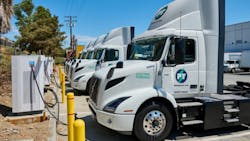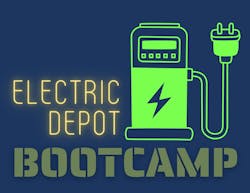NACFE sets out to study how fleet depots are scaling up EV adoption
When the North American Council for Freight Efficiency published its first two Run on Less studies focusing on diesel efficiency in 2017 and 2019, interest was high, but engagement tapered off within months. But fleets are still digging into the council’s 2021 Run on Less-Electric findings.
NACFE unveiled new plans for its next freight efficiency study, which will again look at how commercial battery-electric vehicles operate within eight U.S. fleets—and how those fleets have grown EV operations.
“The level of engagement of people looking at our website and downloading (Run on Less-Electric) reports went on for well over a year,” Dave Schaller, NACFE’s director of industry engagement, said during a virtual press briefing on April 26. “People are still looking at this data. They’re still learning from it. So why are we back with another electric Run? The public seems to want to know about this.”
See also: ABCs and 123s of charging infrastructure
This fall, eight fleet depots will be part of NACFE and RMI’s Run on Less—Electric Depot, focusing on how fleets are scaling up electric trucks across various market segments. The fleets include some of the largest and most well-known in the U.S. as well as some smaller operations that have recently scaled up from one or two EVs to 15 or more operating from the same depot.
For fleets and other transportation leaders looking for even more on the electrification journey, NACFE also is running a free 10-session Electric Depot Bootcamp that kicked off this week.
How fleets scale up EVs
See also: Cutting taxes could cut emissions faster than imposing EVs on fleets
The fourth NACFE Run on Less is “looking at how you scale electric trucks early in this journey,” Mike Roeth, NACFE’s executive director, said during the briefing. “It’s about depot infrastructure. It’s about those trucks that return to base, most likely, every day or consistently. These are the early adopters who we’re wanting to learn about this year.
Roeth said the fleets will share information on charging infrastructure, engagement with utility companies, total cost of ownership, management, truck performance, driver and technician training, charge management, and more.
The three-week event will start Sept. 11. Metrics and real-world stories from the depots will be shared on runonless.com. Seven of the eight participating depots are in California and one is in New York City. Roeth noted that those are the two states that have seen the largest scaling up of EVs. The participating fleets and locations are:
- Frito-Lay in Queens, New York
- OK Produce in Fresno, California
- Penske in Ontario, California
- Pepsi Beverages in Sacramento, California
- Performance Team Logistics in Commerce, California
- Schneider in South El Monte, California
- UPS in Compton, California
- WattEV in Long Beach, California
“As you undoubtedly noticed, the majority of fleets in RoL-E Depot are located in California. Our goal with this event was to showcase fleets that are now deploying 15 or more trucks and we had hoped to have a wider geographic representation,” Schaller said. “The reality is that at this point, the majority of fleets with 15 or more electric trucks are in California, but we believe they are a good representation of the benefits and challenges of deploying electric vehicles at scale.”
Frito-Lay and Pepsi Beverages are subsidiaries of PepsiCo, the second largest private fleet in the U.S., according to the FleetOwner 500: Top Private Fleets of 2023. UPS is the second largest for-hire fleet, according to the FleetOwner 500: Top For-Hire Fleets of 2023. Schneider National is No. 7, Penske is No. 15, and Performance Team Logistics ranks No. 499 on FleetOwner 500: For-Hire.
See also: Veteran drivers teach how to reach 10 MPG
Roeth said that NACFE is interested in how weight plays a role in electric truck ranges. “In our prior work on diesel trucks, it takes a half-mile per gallon of MPG for every 10,000 pounds of freight,” he explained. “If you’re very light haul or hauling empty versus hauling full, that’s like two full MPGs on a seven-mile-per-gallon truck. So weight matters a lot.”
Along with looking at how weight affects EVs, NACFE will also be looking at stop-and-go city delivery versus highway miles; and how aerodynamics and tires affect range. And NACFE will study how fleets are charging their equipment at the depots.
“At some of the depots, there is one charger for every truck, as some people might expect,” Schaller explained. “At least one of the depots, the trucks vastly outnumber the number of chargers. There are different trucks coming in and out of that charger station all day long.”
Emerging stories from the cusp
Added to this year’s Run will be some stories on emerging depots. “In our vetting of the fleet depots for this Run, we came across fleets that are on the cusp of scaling up the number of electric vehicles in their operation. While they did not meet the criteria for this year’s Run, we still believe there are valuable lessons they can teach us,” Roeth says.
Executive sponsor PepsiCo joins title sponsors Cummins and Shell, with others sponsoring individual elements of the Run as well. Roeth said that NACFE is still seeking additional sponsors for the study.
Electric Depot Bootcamp
Other topics are:
- Electric Truck Developments
- Faster Charging — Opportunities and Challenges at 360KW and Higher
- Opportunities to Extend BEV Range
- Electricity Resiliency and Availability
- Current and Future Regulations for Zero-Emission Trucks
- Selecting and Managing Cost-Effective Charging
- Scaling Charging Infrastructure Equipment
- Electric Deport Site Planning and Construction
You can register for the Electric Depot Bootcamp here.
About the Author
Josh Fisher
Editor-in-Chief
Editor-in-Chief Josh Fisher has been with FleetOwner since 2017. He covers everything from modern fleet management to operational efficiency, artificial intelligence, autonomous trucking, alternative fuels and powertrains, regulations, and emerging transportation technology. Based in Maryland, he writes the Lane Shift Ahead column about the changing North American transportation landscape.



